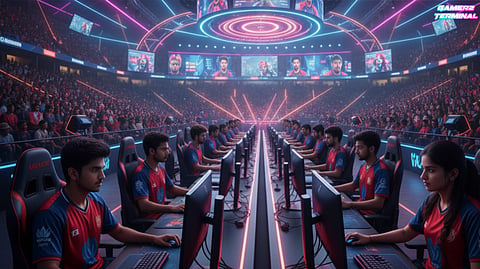

In a landmark move for India’s digital economy and youth-centric industries, the Ministry of Electronics and Information Technology (MeitY) has drafted the Promotion and Regulation of Online Gaming Rules, 2025 (“Draft Rules”). The Ministry is also inviting feedback from stakeholders to refine this framework. This initiative aims to formalize online gaming, distinguish skill-based esports from casual social games, and provide a structured regulatory environment for the rapidly growing industry.
A Framework for Recognition and Regulation
One of the most significant aspects of the draft is the recognition of esports under the Ministry of Youth Affairs and Sports, thereby granting competitive gaming the same legitimacy as traditional sports disciplines. This recognition is expected to accelerate grassroots participation, open pathways for state and district-level competitions, and encourage long-term career prospects for players.
The draft also calls for the establishment of the Online Gaming Authority of India (OGAI), which will be composed of a Chairperson and five ex-officio members drawn from key ministries. The Authority will oversee a wide mandate:
Determining whether an online game qualifies as an “online money game” or not.
Registration and recognition of esports and online social games.
Maintaining a National Online Social Games and Esports Registry.
Compliance monitoring, grievance redressal, and enforcement.
Imposing penalties and issuing directions where necessary.
All online game service providers will be required to register with OGAI, and esports titles must also receive recognition under the National Sports Governance Act, 2025 before registration. Certificates of registration will be valid for up to five years, providing a structured window for growth, innovation, and continuity.
Incentives, Grievances, and Compliance
The draft rules outline that once registered, esports and social game providers can access government support and incentives for promotion and development. However, if registration is cancelled, service providers will forfeit eligibility for such benefits.
To ensure accountability, every registered esports operator must also establish a functional grievance redressal mechanism to address user complaints related to online social games or esports offerings.
Industry Reactions: Optimism and Caution
Leaders from India’s gaming and esports ecosystem have welcomed the move, viewing it as a decisive step towards legitimacy, investment, and sustainable growth.
Akshat Rathee, Co-founder and Managing Director, NODWIN Gaming, highlighted the significance of formal recognition. He noted, “By bringing esports firmly under the Ministry of Youth Affairs & Sports, the government has recognised esports as a legitimate sport while creating a framework for structured growth. This should accelerate grassroots programs, open the door for state and district-level championships, and ensure players see a clear career pathway much like traditional sports. It also boosts investor and sponsor confidence, which is critical to scaling prize pools, infrastructure, and IP development.”
“At the same time, the composition, impartiality, and industry knowledge of the proposed Online Gaming Authority of India (OGAI) will be of utmost importance. We expect that the right stakeholders, those who have worked on this industry since its inception and deeply understand the ecosystem, will be included to guide it forward. Esports is one of the most aspirational industries for India’s youth, and this step ensures that companies like NODWIN Gaming can continue to build a sustainable, world-class ecosystem that competes globally while remaining rooted in India’s sporting fabric,” he stated.
Animesh Agarwal, Co-founder and CEO, S8UL, called the development a “landmark moment” for India’s gaming industry. He said, “This is a landmark moment for India’s gaming and esports industry. Official recognition and a clear distinction provide much-needed legitimacy and clarity to players, creators, organizations, investors and other stakeholders. This distinction is important as it opens the door to greater societal and parental acceptance, encouraging new talent to pursue esports with the same dignity as cricket, football or badminton. It also reassures brands and investors that they are entering a structured, regulated ecosystem.”
He stated, “This clarity is set to attract more brands and partners, unlocking larger sponsorships, creator collaborations, and grassroots programs. Esports in India is no longer just a trend. It’s a legitimate career path, and S8UL is leading the way."
Vishal Parekh, COO, CyberPowerPC India, emphasized the economic and cultural potential of the sector. He noted, “The government’s focus on gaming and e-sports is an encouraging signal that India sees the sector’s cultural and economic potential. Many games today sit in a grey area between skill-based competition and social entertainment, which can make regulatory jurisdiction complex. In this context, the Online Gaming Authority of India (OGAI) will play a key role in providing clarity, aligning ministries, and ensuring a transparent and predictable registration process, so developers can innovate with confidence.”
He added, “Beyond registration, building a robust ecosystem, including dedicated infrastructure, training academies, recognition of players as athletes, and supportive policies, will unlock significant opportunities across jobs, startups, content creation, broadcasting, and global tournaments. With the right balance of creativity, compliance, and economic vision, India can emerge as a global hub for competitive gaming and innovation."
Towards a Global Gaming Hub
With the Draft Rules 2025, India is positioning itself not just as a major consumer of gaming content but as a potential global hub for esports and competitive gaming innovation. By integrating compliance with promotion, and recognition with regulation, the government seeks to balance youth aspirations, economic growth, and responsible gameplay.
If implemented with inclusivity and foresight, these draft rules could mark the beginning of a new chapter where Indian esports athletes, organizations, and innovators can compete on equal footing with the world’s best—while building a robust homegrown ecosystem that reflects India’s sporting and digital ambitions.
